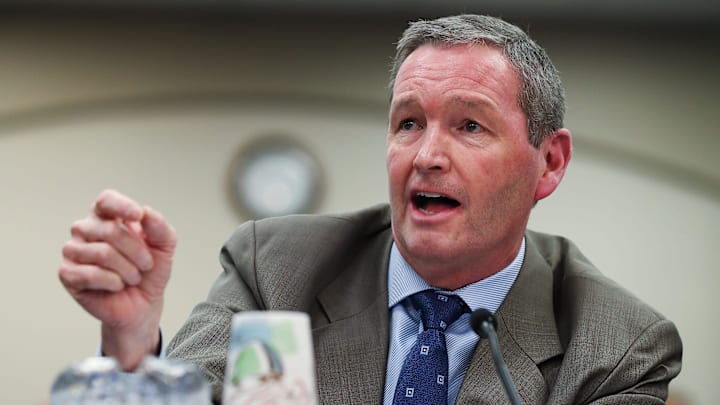Mitch Barnhart's contract runs through June 2028
Mitch Barnhart has been Kentucky’s athletic director since 2002, but longevity doesn’t equal perfection. From baffling extensions to verbal agreements gone wrong, Barnhart’s contract history reads more like a legal thriller than a model of administrative efficiency.
Let’s start with Billy Gillispie. Hired in 2007, Gillispie never signed a formal contract. Instead, he operated under a Memorandum of Understanding (MOU) that outlined salary and benefits but fell short of being legally binding. When Kentucky fired him after just two tumultuous seasons, Gillispie sued, claiming he was owed millions. The messy settlement left a black eye on the program.

Then came the Joker Phillips “head coach in waiting” era—a noble but ultimately doomed succession plan. When Phillips took over from Rich Brooks in 2010, the results spiraled quickly, culminating in a 2-10 season in 2012. His early exit cost the university millions and delayed Kentucky’s football rebuild by years.
And who could forget John Calipari’s lifetime contract? Signed in 2019, it included an eye-watering buyout clause that effectively made Cal untouchable—even as on-court results began to decline. Though Calipari eventually left for Arkansas in 2024, the financial handcuffs he left behind are still felt.
Then you have the ill-fated extension for women's basketball coach Kyra Elzy. After being under .500 despite Rhyne Howard, Elzy's Cats ran off 10 straight wins to win the SEC Tournament and get into the NCAA tournament (where they lost the first round); she was handed an extension. She was then fired 2 years later after going 12-20.
More recently, Barnhart’s auto-extension for Mark Stoops—triggered by a seven-win season—raised eyebrows. In 2022, the clause kicked in just days before Kentucky was blown out at home by Vanderbilt. Timing is everything. And now Stoops has a massive 30+ million dollar buyout that locks him to the University for at least 2 more years.
Now, Barnhart’s own deal is in the spotlight. His current contract runs through June 2028, with a salary escalating from $1.425 million in 2025-26 to $1.7 million in 2027-28. Unless he retires early, or activates a special clause in his contract, he’s not going anywhere—and neither is his decision-making power. That clause we are talking about allows him to give UK 6 months notice and transition into a special assistant to the University President Eli Capiluto. It kicks in next year, June 2026.
To be fair, Barnhart has nailed some hires. Nick Mingione has Kentucky baseball in uncharted territory, and Mark Pope looks like the right man to reboot basketball. Kenny Brooks is still early in his tenure with UK women’s hoops but is trending upward.
Still, it’s reasonable to ask: can Kentucky afford more contract misfires? Or will Barnhart’s legacy be defined as much by his mistakes as his wins?
